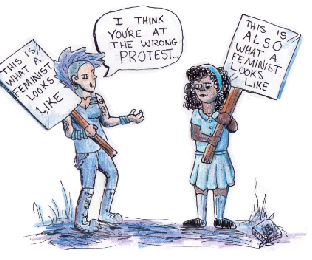Free the Feminist

September 16, 2016
Be pro-activist not, pro-feminist.
Women all around the world are shamed for not embracing themselves enough.
In a society where there are so many stigmas centered around the natural female body, feminists have become notorious for their uncensored bodies. Embracing one’s bare face, naturally hanging breast and body hair are the assumed qualities of the ultimate women’s rights activist. What are we to make of the feminist that chooses to wear makeup and bras, and shaves their visible body hair? The truth is: it is none of our business!
In a 2014 study published by Psychology of Women Quarterly, women were asked to document their experiences while they gave up shaving for 10 weeks. The women who volunteered in this study experienced homophobia, heterosexism, anger from family members and partners, and internalized feelings of being ¨disgusting¨ or ¨dirty¨.
With so many societal pressures on women to look their best and avoid making others uncomfortable, there is an apparent effort among women to defy these body image stigmas. Often times, this effort earns the respect of those who call themselves feminists and others alike. This leaves the community of female activists who choose otherwise tend to be ridiculed by others.
Female feminists are known for making statements through their physical image. These statements explicitly say, “I am a woman and an activist, and I can do what I want despite the traditional gender norm¨. An extreme act such as this is usually praised, while those who work for justice in other ways often go ignored.
Granted, it is believed that in order to display such a powerful message, one must lead by example. In other words, it is a popular belief that if you want to be respected, you must show (through appearance) how serious you are.
But, we must remember that it is a women’s choice and right to style her appearance based on her own preferences. Whether one choses not to conform or to adhere to traditional gender standards does not define the power of their voice as feminist.
It is not anyone else’s place to tell women how to dress and groom themselves. If you do not find yourself directly in a protest, you still have a duty in the progression of our society. The first step towards equality and progression is learning to honor a woman’s personal decisions. When identifying a person who is making change in the world, it is important to acknowledge feminists as exactly who they are, activists. Our duty is to respect other people’s decisions and recognize their efforts as activists.



















